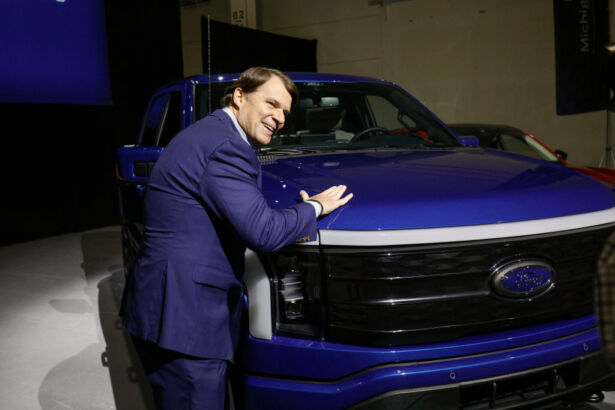Ford Motor Company will transfer some workers from the F-150 Lightning assembly line at Rouge Electric Vehicle Center to another plant for gas-powered vehicles.
“Approximately 1,400 employees will be impacted as the Rouge Electric Vehicle Center transitions to one shift effective April 1. Roughly 700 will transfer to Michigan Assembly Plant and the others will be placed in roles at the Rouge Complex or other facilities in Southeast Michigan, or take advantage of the Special Retirement Incentive Program agreed to in the 2023 Ford-UAW contract,” the company said Friday in a statement.
A third crew will be added to the Michigan Assembly Plant in Wayne with 900 new hires and 700 existing employees from the Rouge Complex in Dearborn.
The company made the move to “meet demand for the popular Bronco and Bronco Raptor and the all-new Ranger and Ranger Raptor.”
The crew at the Michigan Assembly Plant will work seven days a week on two shifts after the transition.
The auto giant said that they’re still confident in electric vehicle’s future “for specific consumers.”
“We are taking advantage of our manufacturing flexibility to offer customers choices while balancing our growth and profitability. Customers love the F-150 Lightning, America’s best-selling EV pickup,” Ford President and CEO Jim Farley said. “We see a bright future for electric vehicles for specific consumers, especially with our upcoming digitally advanced EVs and access to Tesla’s charging network beginning this quarter.”

Ford’s decision came amid reports that electric vehicles are piling up at dealers’ parking lots and more Americans are hesitant to buy electric vehicles.
Growth in the global electric-vehicle market is set to slow to 27.1 percent this year as a reduction in state subsidies makes the cars less appealing to buyers, according to research firm Canalys.
The lower subsidies and higher borrowing costs have weighed on demand at companies, including U.S. market leader Tesla, which slashed sticker prices last year.
“Despite a 20% drop in the ASP (average selling price) of EVs in 2023, insufficient product choices and inconvenient charging experience hampered demand, impacting the market growth of EVs,” said Jason Low, principal analyst at Canalys.
In 2024, the North American EV market is expected to grow 26.8 percent, but with the lowest EV penetration rate of 12.5 percent compared with Greater China and Europe, the research firm said.
Hertz Dumps EVs for Gas Cars
Rental firm Hertz Global Holdings is selling about 20,000 electric vehicles, including Teslas, from its U.S. fleet about two years after a deal with the automaker to offer its vehicles for rent.
The company will instead opt for gas-powered vehicles, it said on Jan. 11, citing higher expenses related to collision and damage for EVs even though it had aimed to convert 25 percent of its fleet to electric by 2024 end.
CEO Stephen Scherr had last year at the JPMorgan Auto Conference flagged headwinds from higher expenses for its EVs, particularly Teslas.
Hertz even limited the torque and speed on the EVs and offered it to experienced users on the platform to make them easier to adapt after certain users had front-end collisions, he said.

Hertz also expects about $245 million in charges related to depreciation expenses from the EV sale in the fourth quarter of 2023.
The car rental giant lists more than 700 EVs on sale, including BMW’s i3, Chevrolet’s Bolt, and Tesla’s Model 3 and Model Y SUVs. It is selling some Tesla Model 3s for as low as about $20,000, nearly half the purchase price for the cheapest variant of the compact sedan, its used car website showed.
Analysts expected Hertz’s latest move will press the price of used electric vehicles lower.
“While 20,000 cars isn’t a large number in the total used vehicle market, it does mean Hertz will be taking a major loss on each of these sales while further contributing to the trend of falling used EV values,” iSeeCars.com analyst Karl Brauer said.
Reuters contributed to this report.
From The Epoch Times


